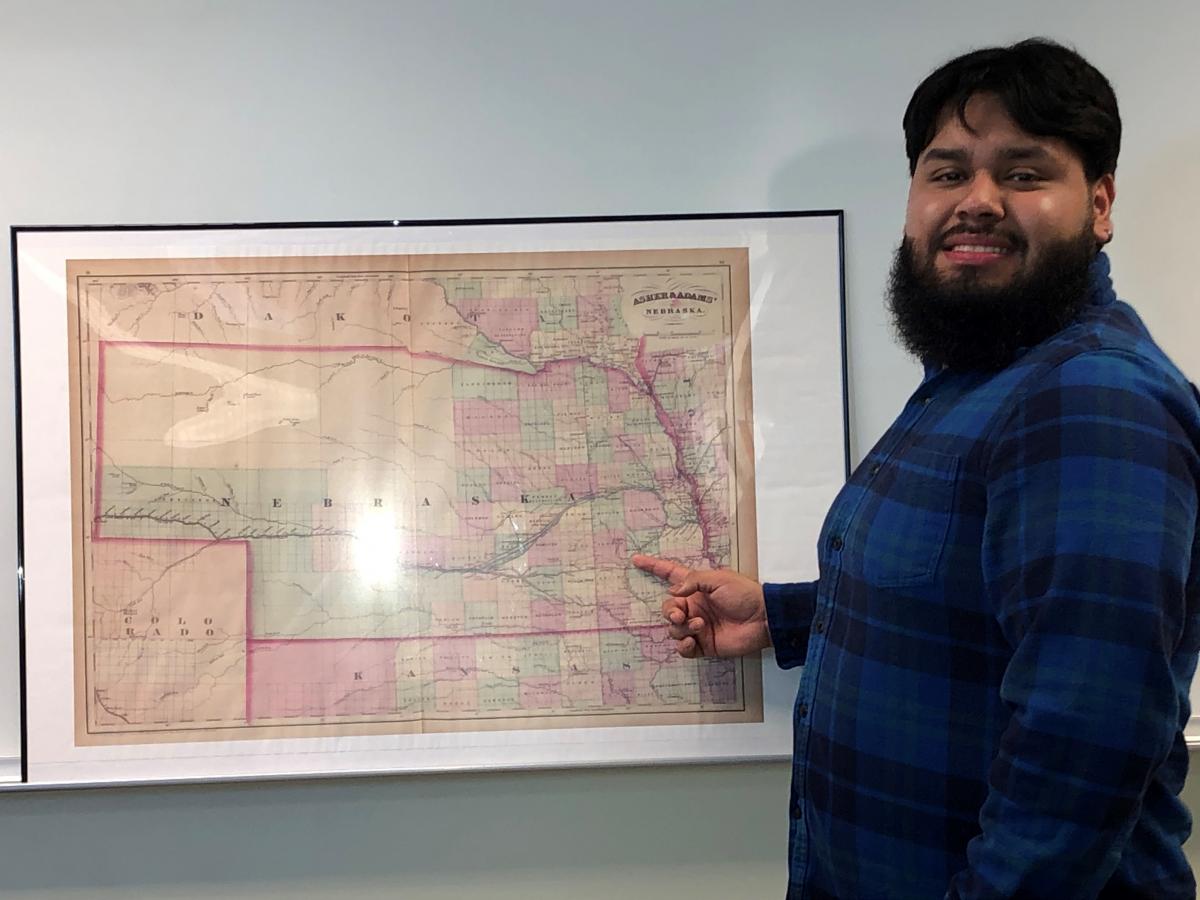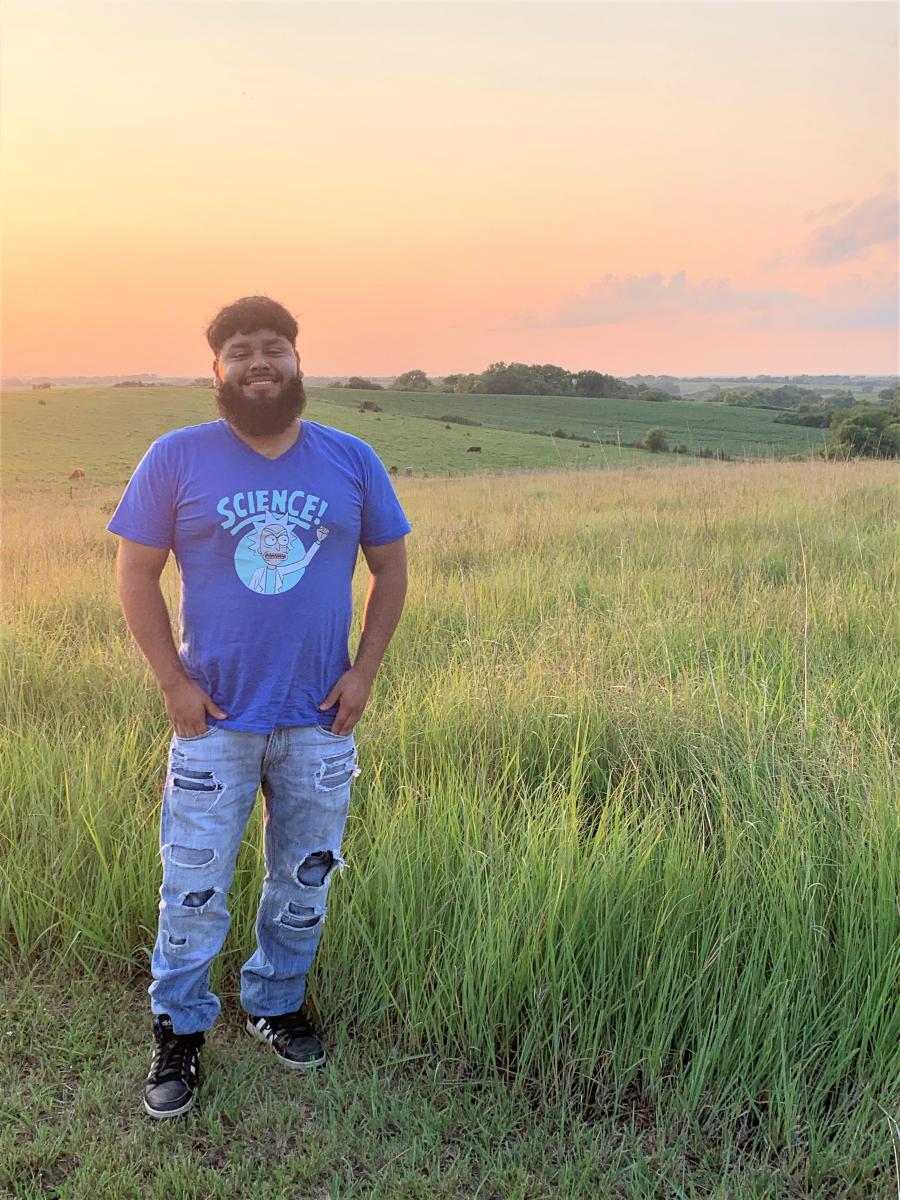Managing lands collaboratively
Chicagoan Daniel Morales came to Nebraska in August 2019 with the goal of earning a master’s degree to prepare him to work at a state, federal or nongovernmental agency in collaborative land management. After facing the challenges of 2020 and persevering in his studies and NRT training, Morales says he is better prepared to take on this management role and has advice for new students also navigating turbulent times.
“The one thing that students can learn from my experience is just how to adapt, learning that there are going to be some changes, if not a lot of changes, to your project, and don’t be scared of setbacks,” he says.

Morales has been working with Craig Allen and Christopher Chizinski, professors in the School of Natural Resources, to survey landowners in the Denton Hills southwest of Lincoln and help them develop plans to collaboratively manage lands in the area.
The Denton Hills hold unplowed, fragmented grasslands and other landscapes important to local birds, pollinators, and other animals. Morales says the spread of invasive and nonnative plant species into the region is one issue he and the professors would like to work on with landowners.
“Woody encroachment could spread into the grasslands to the point where there are more trees than grasslands and we could lose the grasslands,” Morales says. “Keeping the grasslands resilient, preventing them from going into an alternative stable state, is more desirable.”
Another issue to address, Morales says, is that some landowners may want to fight unwanted trees and shrubs with prescribed burning but other landowners may not want fire close to their property.
“So, just trying to bring that thought process, making them think, ‘OK, there are some disagreements and agreements, is there a way we can work together as private landowners as a community?’” Morales says.
He, the professors and the nearby Spring Creek Audubon Center planned to host scenario-planning workshops with local landowners in 2020, but the pandemic made such meetings nonviable. Morales says they hope to host these in 2021, and he continues working through his program of study.
This is not the first time he has encountered a roadblock while trying to achieve his goals.

Morales says he had wanted to earn his graduate degree from Nebraska for years and applied unsuccessfully once to the School of Biological Sciences before being admitted to the NRT and School of Natural Resources. Between applications, he gained more experience by volunteering for the AmeriCorps and working with the U.S. Fish and Wildlife Service, surveying Cypress Creek National Wildlife Refuge for invasive species, fielding calls from hunters, and leading canoe tours with middle grade and high school students. When the refuge manager allowed him to attend meetings with private landowners about the management of a local river, the experience solidified his interest in the management of natural resources. Morales had a paper from his undergraduate years published and was able to apply to the NRT with confidence about his research interests and career aspirations. He now encourages other students to pick themselves up after a setback, brush themselves off and start again.
“A lot of new folks I meet in grad school, they have to be perfect,” Morales says. “They have to be on top and everything like that. That’s great and everything, but there is going to be a time when something is going to go wrong—let’s just say like an experiment. If you run some experiment in the lab, if it doesn’t work the way you hoped, it’s not the end of the world. You can always do it again or improve on the methods.”
He says he tells other students not to fear hardships or setbacks but to learn from them.
“Facing hardships and dealing with setbacks will teach you a lot,” he says.
As he speaks about the hardships of his first years in graduate school, he recognizes future hardships he may face in collaborative management and draws from his current experiences to keep a positive perspective.
“Managing landscapes requires the effort of more people, and that involves hardships,” he says. “Some people are not going to agree with everything you say, and you have to take it as it is, but that’s the challenge, that’s the beauty, just how to engage with people and how to reach out to them.”
— Ronica Stromberg, National Research Traineeship Program Coordinator



